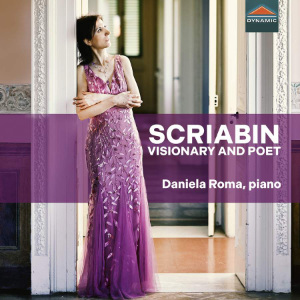
Alexander Scriabin (1872-1915)
Visionary and Poet
Fantasy Op.28 (1900)
Two Impromptus Op.12 (1895)
Six Preludes Op.13 (1895)
Etude Op.2 No.1 (1887)
Twelve Etudes Op.8 (1894)
Allegro de Concert Op.18 (1896)
Daniela Roma (piano)
rec. 2022, Studio Griffa, Milan
DYNAMIC CDS7984 [64]
The title of this disc is eminently suitable to describe Scriabin; even a cursory listen to a handful of pieces, especially his earlier works, would convince anyone of his standing as a poet and his later harmonic paths and dreams of an all-encompassing art, music interwoven with all the senses speak of his visionary nature and yet…this is a recital that concentrates on the music of his first period and for all the new textures and harmonies in a piece like the Fantasy op.28 there is really nothing of Scriabin the visionary here.
Daniela Roma opens with the Fantasy; I have loved this piece since hearing John Ogden’s Scriabin LP (HQS1296) in the 1970s and I still find the passion and drive of his playing intoxicating. Roma manages to capture much of that and certainly has the fingers for the incredible complexity of this music. She is equally home in some of the rarer items here, the Impromptus and Allegro de Concert, both from the mid-1890s. The latter especially impressed me and if the piece isn’t perhaps the composer at his best Roma singing out the grand theme in the maestoso half way through makes you want to hear more like this. Her sense of a singing line in virtuoso writing is clear in the first of the two impromptus with its constantly surging left hand accompaniment or the prélude op13 no.4 though there are moments where she sounds less connected to the music; the third of the op.13 préludes has a beautiful sound but is too rigid, lacking that subtle rubato that Maria Lettberg finds in her (almost) complete traversal (Capriccio 49586 review). She is however delightful in the previous prélude, all sparkling fingerwork and brusquely characterful in the last of the set.
On the whole her études are mostly well played from the vibrancy and vigour of the first to the angst laden final étude and with some nice moments along the way; a wonderfully poised E major étude, no.5, the fourth with a flexible, sensuous flow and a melancholy and lyrical eleventh étude. There are things I am not so taken with. The third is all there but seems a bit literal; Matthieu Idmtal on Pavane adopts the same tempo but captures more of the urgency and in the double notes of the A major and D flat major études there is occasional stiffness that is not found in Lettberg or Idmtal. In an otherwise lovely eighth étude I find her two against three rhythm at 1:40 disappointingly executed but this is just a handful of bars. These caveats are not putting me off the disc; I find that there are issues in every recording of the op.8 études that I have heard and tend to cherry pick my favourites from those. Roma plays the seventh well for instance but I will always treasure Grigory Ginzburg’s peerless live performance. The sole étude from the three pieces op.2, remarkably dating from his fourteenth year and so beloved of Vladimir Horowitz, seems a little fast under Roma’s fingers but in truth it is perhaps that she doesn’t linger or caress the notes as Horowitz was wont to do. My only real issue with her performance is the left hand A sharp she plays in the bar before the return of the theme instead of the miraculously aching clash of the A natural with the G sharp. How did this slip past editing?
Having recently had my ears around Hamelin’s brightly recorded disc of the Bolcom Rags I found the sound here a wee bit bass heavy but not intrusively so and I soon settled into it. This is a decent foray into Scriabin’s output from the 1890s and but for a few minor points it is one I enjoyed.
Rob Challinor
Help us financially by purchasing from





















